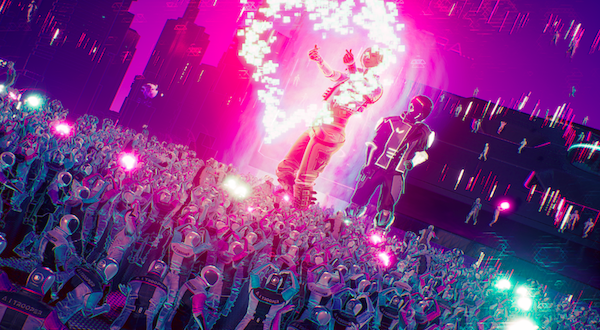How The Metaverse Could Be the Future Of Live Music

At this year’s Pollstar Live conference in Los Angeles, a panel of tech and music executives talked about industry trends reshaping live entertainment in the post-pandemic era.
Buzz words such as “metaverse”, “Web3”, “NFTs”, “cryptocurrency” and “blockchain” were common themes.
“The new Web3 world is still emerging,” Derek Sutton-Shearer said, the CEO of NFT consulting and marketing firm PIXL8. “Web 2 allowed you to focus on the quantity of fans, scaling. WHile Web3 allows us to focus on the quality of fans and the quality of that experience.”
Many in the metaverse space believe the conversation is moving away from buzzwords to a refocus on its experiences and options. The potential is significant in Australia.
“Given what we have just been through with COVID, every act has essentially been a virtual band,” Theo Kanellopoulos said, founder of Melbourne-based Lucky NFT.
“I see a future where you can choose to either go and see a gig in real life or just jump into the metaverse and see that same gig from your house as if you were there.
“I don’t think there is a big market for that exact example just yet, but people have always looked for escapism and new experiences so we won’t be too far off.”
This summer, Lucky NFT collaborated with Tennis Australia to create its first virtual closing party featuring DJs Steve Aoki and Tigerlily and hip-hop act Masked Wolf.
Its biggest audience was from the U.S. at 20%, while Australians made up 6—7%.
The top half dozen markets included the U.K, Spain, Germany, Japan, Korea and Hong Kong.
“That’s what made it so special – the ability for anyone anywhere to join in for an experience that is unmatched,” Ridley Plummer said, the metaverse and NFT project manager at Tennis Australia.
Future after-parties will showcase music, entertainment and comedy.
For Plummer, the metaverse is the channel through which Tennis Australia can transform from a sports association to a global brand incorporating entertainment, retail, collectibles and experiences, and extending beyond tennis and Australia.
“The possibilities are huge,” Plummer said, “we’re talking to some of our partners on how we integrate them and their experiences to our metaverse.”
Other music companies are musing their own options in recent months.
Universal Music Group launched metaverse avatars for some of its artists including Justin Bieber, Shawn Mendes, Rihanna and Migos.
Warner Music Group teamed with gaming virtual world The Sandbox to create a virtual performance space that is half concert hall and half theme park.
In March 2022, EDM promoter Insomniac Events and US games maker Unity (which boasts two billion monthly users) partnered to build a “new, persistent metaverse world” where fans can watch virtual concerts.
Insomniac founder Pasquale Rotella explained: “Our vision is to create a social experience in which everyone is a headliner – where stories and music unite us in discovery, love and a true sense of belonging.”
This sense of belonging and community was brought up at the Pollstar Live panel by Good Charlotte’s Benji Madden.
Madden, whose livestreaming platform Veeps was acquired by Live Nation in January 2021, said new communities in Web3 were no different from the physical ones created around Seattle grunge or Bay Area punk in the nineties.
“It’s really, really cool because you don’t always get to feel that. It kind of comes at these special moments in time,” he said, per Pollstar.
“You feel the energy and you see these communities building … they’re just going and having fun and playing, and in that process they’re inventing how we’re going to interact.
“They’re inventing how we’re gonna use these [Web3 platforms].”
This article originally appeared on The Industry Observer, which is now part of The Music Network.






























